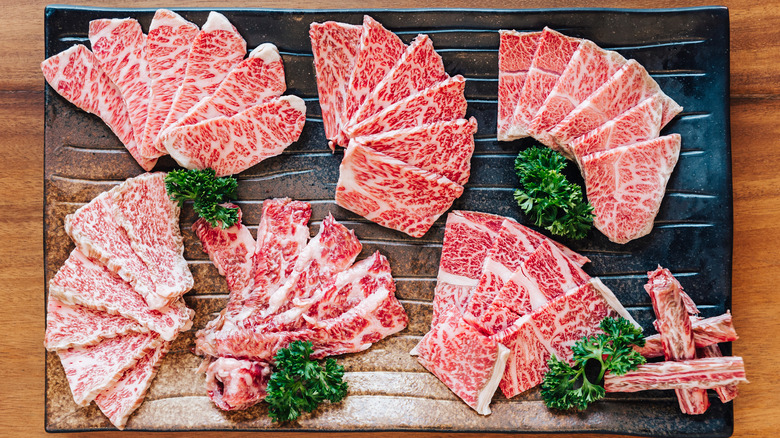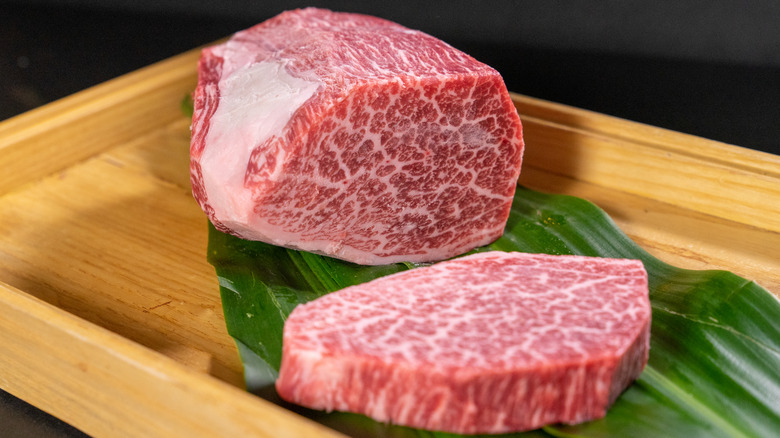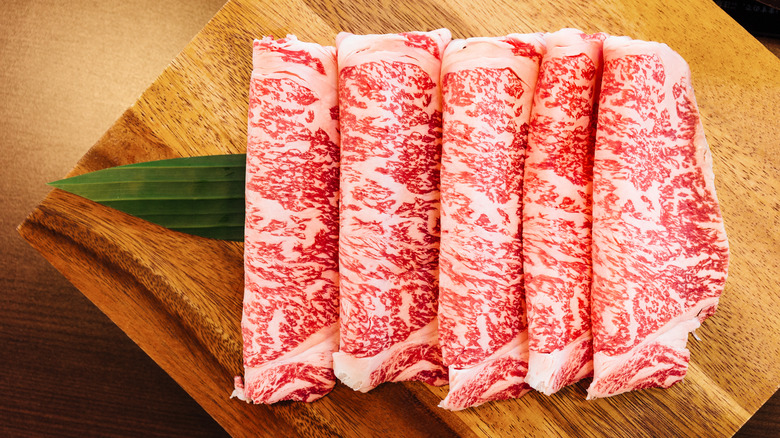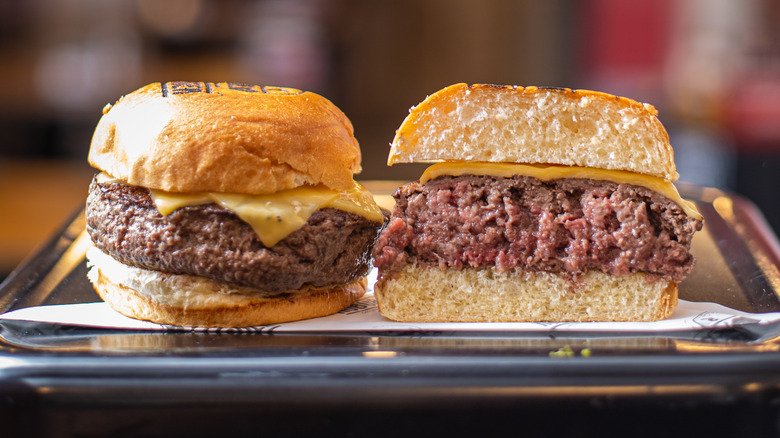What You Should Look For When Buying Wagyu Beef
Wagyu beef is world-renowned for its quality and accompanying price tag. Business Insider reports that a single pound of the stuff can sell for as much as $200, and an individual Wagyu cow can fetch $30,000 or more. Comparatively, American Angus cattle often go for less than a tenth of that cost. Unfortunately, whenever something draws the kind of money and publicity that Wagyu beef does, folks are bound to emerge from the woodwork with a shifty plan to cash in. Multiple restaurants have been busted for selling fake Wagyu beef, and there have even been lawsuits over the matter.
Real Wagyu beef comes from cattle unique to Japan (the name literally means "Japanese cow"), which are specially bred for their unique fatty musculature, per Business Insider. Because their fat is more evenly dispersed within the muscle tissue, Wagyu is especially tender and rich. This is partially achieved by feeding the cows a specialty, energy-dense diet, sometimes incorporating unusual foods like dried olive peels. The entire cattle-raising process is strictly regulated by the Japanese government, and if their standards aren't met, the meat won't be certified for market. So how can you ensure you're getting real Wagyu, with the official seal of approval? Look for these signs.
Signs of quality
Wagyu beef must be certified before it goes to market, and a real piece of Wagyu will come with official paperwork to prove the fact. However, Bon Appétit cautions against putting all your faith in these documents alone, as they may be outdated or fake. You need to know some basic facts about Wagyu so you can verify any claims for yourself. Starting with perhaps the simplest clue: Wagyu beef can only be legally imported to the U.S. in boneless cuts, so if you ever see bone-in Wagyu steaks on a menu or in a butcher's case, they are almost certainly fake. One California restaurant is bucking this trend by importing whole Wagyu carcasses, but unless your butcher is doing the same, any bone-in Wagyu is a red flag.
Raw Wagyu is fortunately fairly easy to identify on sight because of its unique appearance. The Wagyu Shop notes that Wagyu beef should not have a large fat cap like you may be used to seeing on steaks. Instead, the fat should be evenly dispersed throughout the muscle in thin white veins. Wagyu should also be a pale pink color rather than the bright red hue of an American steak, further reflecting the even integration of fat and muscle.
The Wagyu grading system
If you're going to spend the money to get authentic Japanese Wagyu beef, you might as well get the very best, so let's break down Wagyu grading. The Wagyu Shop reveals that all authentic Wagyu beef must be graded by the Japanese Meat Grading Association. They assign a grade in the form of a letter (A, B, or C) followed by a number (1-5).
The letter in the Wagyu grade refers to the yield, which is the weight of edible meat compared to the total weight of the animal. A yield of 72% or higher receives an A. Anything below 69% receives a C. The slim margin in the middle is given a B. The number in the Wagyu grade refers to the grade of the meat (yes, there is a grade within a grade). This is based on four factors: the fat, the marbling, the color, and the texture. The higher the number, the better. Business Insider notes that, while A5 is the highest quality, nothing graded below A3 is certified for sale in Japan.
Say no to Kobe beef
One last note: if you see Kobe beef for sale in the United States, don't fall for it. Kobe is a specific breed of Wagyu whose name has achieved wild popularity in the U.S., but authentic Kobe beef can only be bred in Japan's Kobe prefecture, and Bon Appétit reports that it is not available for retail in the United States. American menus love to advertise things like Kobe beef sliders as luxury items, but as of 2016, only eight American restaurants had licenses to import real Kobe beef.
Kobe beef burgers and sliders are a particular red flag, Business Insider reports, because authentic Kobe beef meat is too tender and fatty to hold the shape of a patty in the first place. Bon Appétit notes that much of what is being called Kobe beef in the U.S. is actually American Wagyu, a crossbreed of authentic Japanese Wagyu and American Angus sometimes referred to as "Wangus beef."



